Historical Analysis of Education in the West: Key Developments
VerifiedAdded on 2022/10/10
|5
|1067
|17
Essay
AI Summary
This essay provides a comprehensive overview of the historical developments of education in the West, spanning from the 17th century to the present. It examines the influence of economic, social, and intellectual forces on educational reform, including the rise of industrialization and urbanization. The essay highlights the differing approaches of countries like the United States and France in establishing educational systems. It delves into the contributions of prominent theorists and reformers such as Rousseau, Pestalozzi, Froebel, and Herbart, exploring their impact on educational theory and practice. Furthermore, it categorizes current educational philosophies and discusses the influence of key social, political, and cultural ideas, including the abolition of segregation and the Title IX of the Education Amendments Act. Finally, the essay explores the influence of biblical principles on education, emphasizing parental roles, discipleship, and character training.
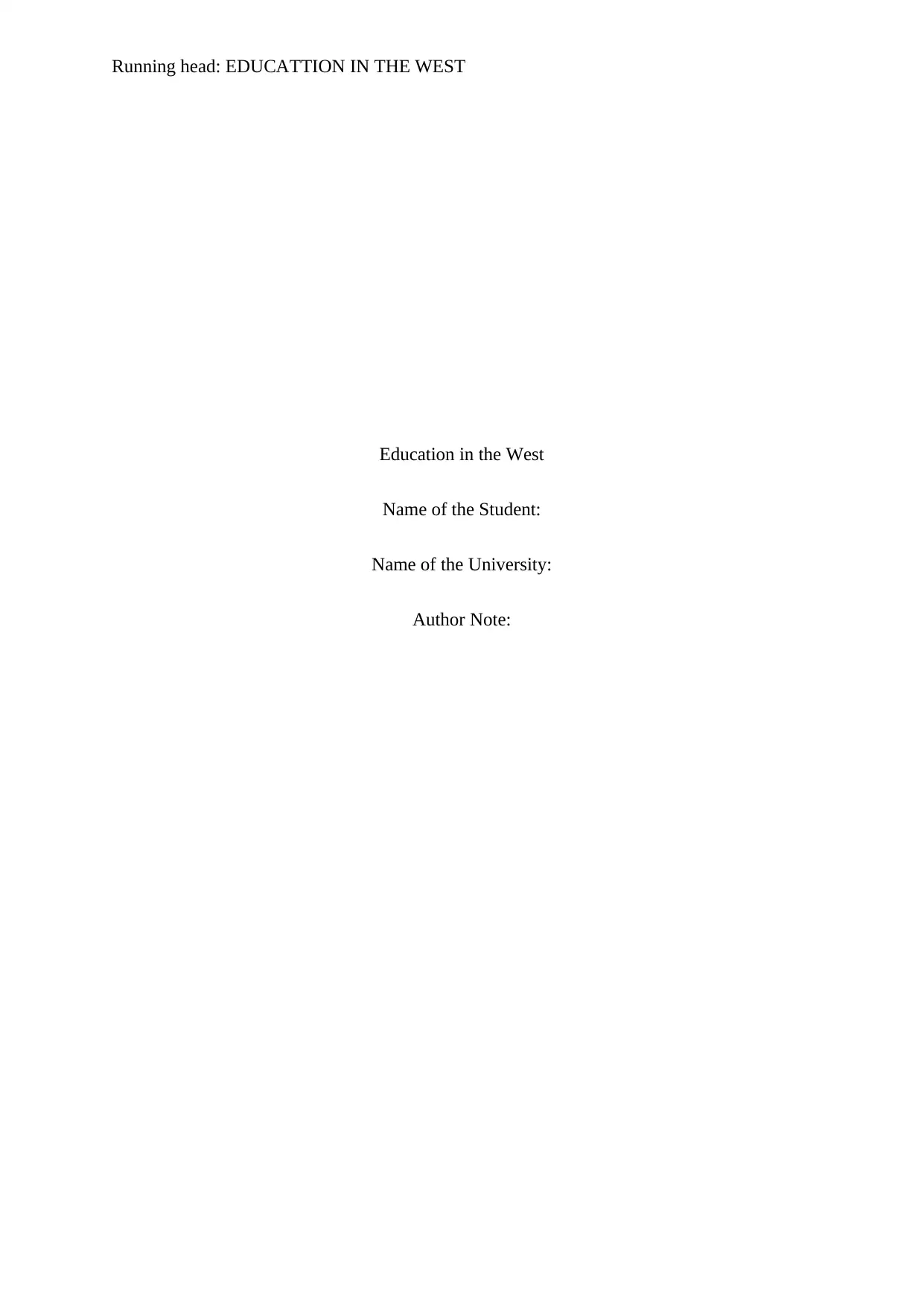
Running head: EDUCATTION IN THE WEST
Education in the West
Name of the Student:
Name of the University:
Author Note:
Education in the West
Name of the Student:
Name of the University:
Author Note:
Paraphrase This Document
Need a fresh take? Get an instant paraphrase of this document with our AI Paraphraser
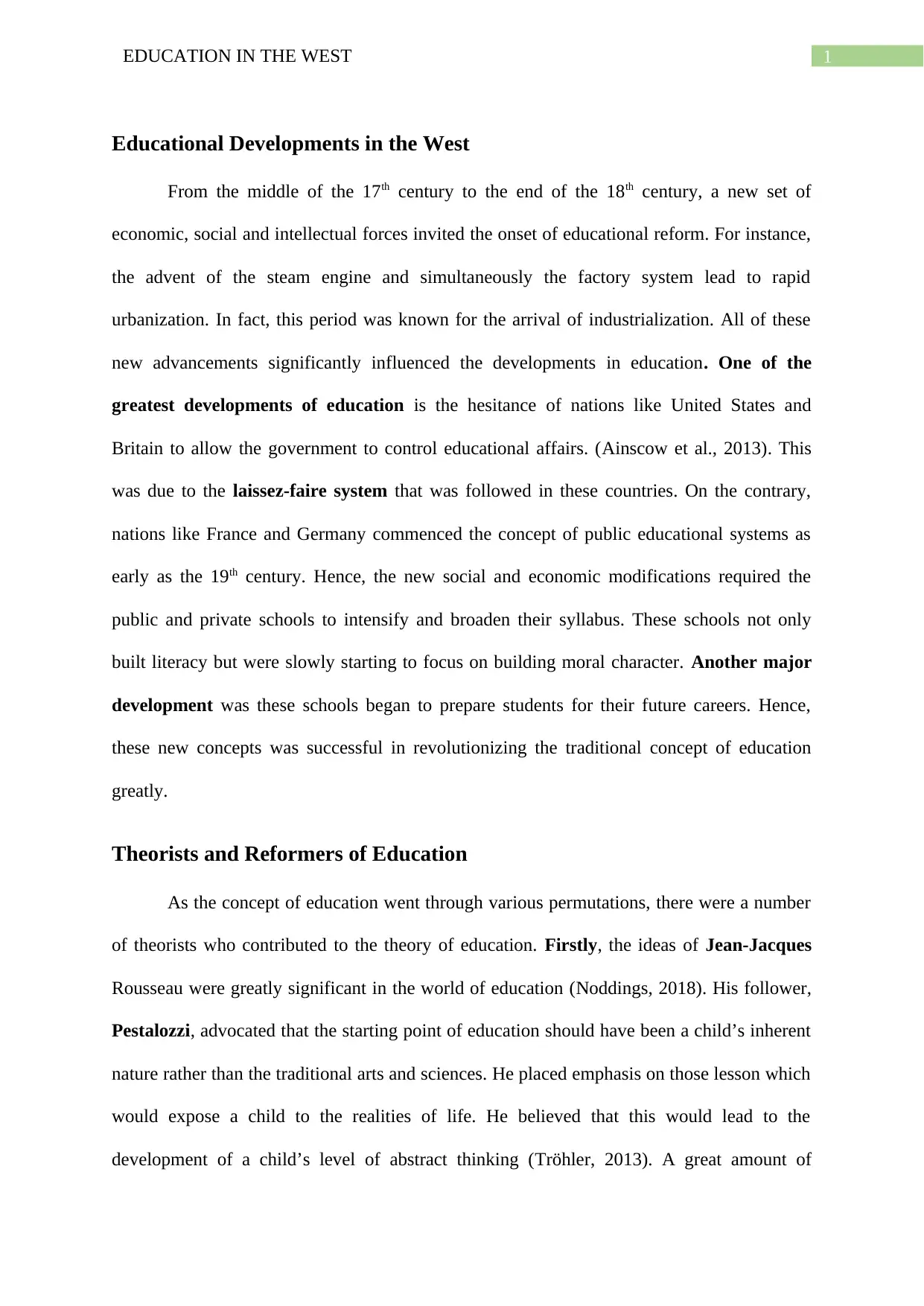
1EDUCATION IN THE WEST
Educational Developments in the West
From the middle of the 17th century to the end of the 18th century, a new set of
economic, social and intellectual forces invited the onset of educational reform. For instance,
the advent of the steam engine and simultaneously the factory system lead to rapid
urbanization. In fact, this period was known for the arrival of industrialization. All of these
new advancements significantly influenced the developments in education. One of the
greatest developments of education is the hesitance of nations like United States and
Britain to allow the government to control educational affairs. (Ainscow et al., 2013). This
was due to the laissez-faire system that was followed in these countries. On the contrary,
nations like France and Germany commenced the concept of public educational systems as
early as the 19th century. Hence, the new social and economic modifications required the
public and private schools to intensify and broaden their syllabus. These schools not only
built literacy but were slowly starting to focus on building moral character. Another major
development was these schools began to prepare students for their future careers. Hence,
these new concepts was successful in revolutionizing the traditional concept of education
greatly.
Theorists and Reformers of Education
As the concept of education went through various permutations, there were a number
of theorists who contributed to the theory of education. Firstly, the ideas of Jean-Jacques
Rousseau were greatly significant in the world of education (Noddings, 2018). His follower,
Pestalozzi, advocated that the starting point of education should have been a child’s inherent
nature rather than the traditional arts and sciences. He placed emphasis on those lesson which
would expose a child to the realities of life. He believed that this would lead to the
development of a child’s level of abstract thinking (Tröhler, 2013). A great amount of
Educational Developments in the West
From the middle of the 17th century to the end of the 18th century, a new set of
economic, social and intellectual forces invited the onset of educational reform. For instance,
the advent of the steam engine and simultaneously the factory system lead to rapid
urbanization. In fact, this period was known for the arrival of industrialization. All of these
new advancements significantly influenced the developments in education. One of the
greatest developments of education is the hesitance of nations like United States and
Britain to allow the government to control educational affairs. (Ainscow et al., 2013). This
was due to the laissez-faire system that was followed in these countries. On the contrary,
nations like France and Germany commenced the concept of public educational systems as
early as the 19th century. Hence, the new social and economic modifications required the
public and private schools to intensify and broaden their syllabus. These schools not only
built literacy but were slowly starting to focus on building moral character. Another major
development was these schools began to prepare students for their future careers. Hence,
these new concepts was successful in revolutionizing the traditional concept of education
greatly.
Theorists and Reformers of Education
As the concept of education went through various permutations, there were a number
of theorists who contributed to the theory of education. Firstly, the ideas of Jean-Jacques
Rousseau were greatly significant in the world of education (Noddings, 2018). His follower,
Pestalozzi, advocated that the starting point of education should have been a child’s inherent
nature rather than the traditional arts and sciences. He placed emphasis on those lesson which
would expose a child to the realities of life. He believed that this would lead to the
development of a child’s level of abstract thinking (Tröhler, 2013). A great amount of
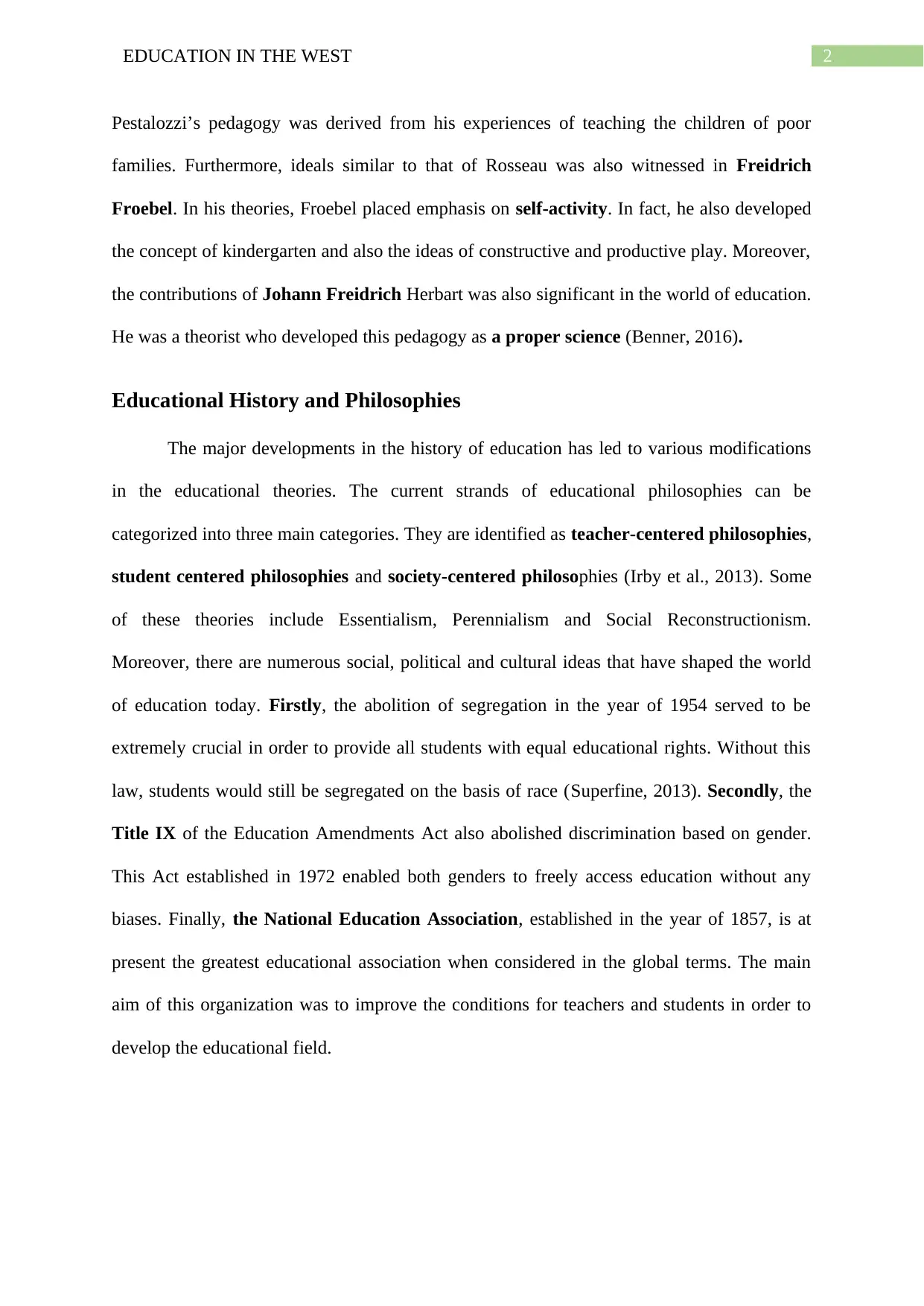
2EDUCATION IN THE WEST
Pestalozzi’s pedagogy was derived from his experiences of teaching the children of poor
families. Furthermore, ideals similar to that of Rosseau was also witnessed in Freidrich
Froebel. In his theories, Froebel placed emphasis on self-activity. In fact, he also developed
the concept of kindergarten and also the ideas of constructive and productive play. Moreover,
the contributions of Johann Freidrich Herbart was also significant in the world of education.
He was a theorist who developed this pedagogy as a proper science (Benner, 2016).
Educational History and Philosophies
The major developments in the history of education has led to various modifications
in the educational theories. The current strands of educational philosophies can be
categorized into three main categories. They are identified as teacher-centered philosophies,
student centered philosophies and society-centered philosophies (Irby et al., 2013). Some
of these theories include Essentialism, Perennialism and Social Reconstructionism.
Moreover, there are numerous social, political and cultural ideas that have shaped the world
of education today. Firstly, the abolition of segregation in the year of 1954 served to be
extremely crucial in order to provide all students with equal educational rights. Without this
law, students would still be segregated on the basis of race (Superfine, 2013). Secondly, the
Title IX of the Education Amendments Act also abolished discrimination based on gender.
This Act established in 1972 enabled both genders to freely access education without any
biases. Finally, the National Education Association, established in the year of 1857, is at
present the greatest educational association when considered in the global terms. The main
aim of this organization was to improve the conditions for teachers and students in order to
develop the educational field.
Pestalozzi’s pedagogy was derived from his experiences of teaching the children of poor
families. Furthermore, ideals similar to that of Rosseau was also witnessed in Freidrich
Froebel. In his theories, Froebel placed emphasis on self-activity. In fact, he also developed
the concept of kindergarten and also the ideas of constructive and productive play. Moreover,
the contributions of Johann Freidrich Herbart was also significant in the world of education.
He was a theorist who developed this pedagogy as a proper science (Benner, 2016).
Educational History and Philosophies
The major developments in the history of education has led to various modifications
in the educational theories. The current strands of educational philosophies can be
categorized into three main categories. They are identified as teacher-centered philosophies,
student centered philosophies and society-centered philosophies (Irby et al., 2013). Some
of these theories include Essentialism, Perennialism and Social Reconstructionism.
Moreover, there are numerous social, political and cultural ideas that have shaped the world
of education today. Firstly, the abolition of segregation in the year of 1954 served to be
extremely crucial in order to provide all students with equal educational rights. Without this
law, students would still be segregated on the basis of race (Superfine, 2013). Secondly, the
Title IX of the Education Amendments Act also abolished discrimination based on gender.
This Act established in 1972 enabled both genders to freely access education without any
biases. Finally, the National Education Association, established in the year of 1857, is at
present the greatest educational association when considered in the global terms. The main
aim of this organization was to improve the conditions for teachers and students in order to
develop the educational field.
⊘ This is a preview!⊘
Do you want full access?
Subscribe today to unlock all pages.

Trusted by 1+ million students worldwide
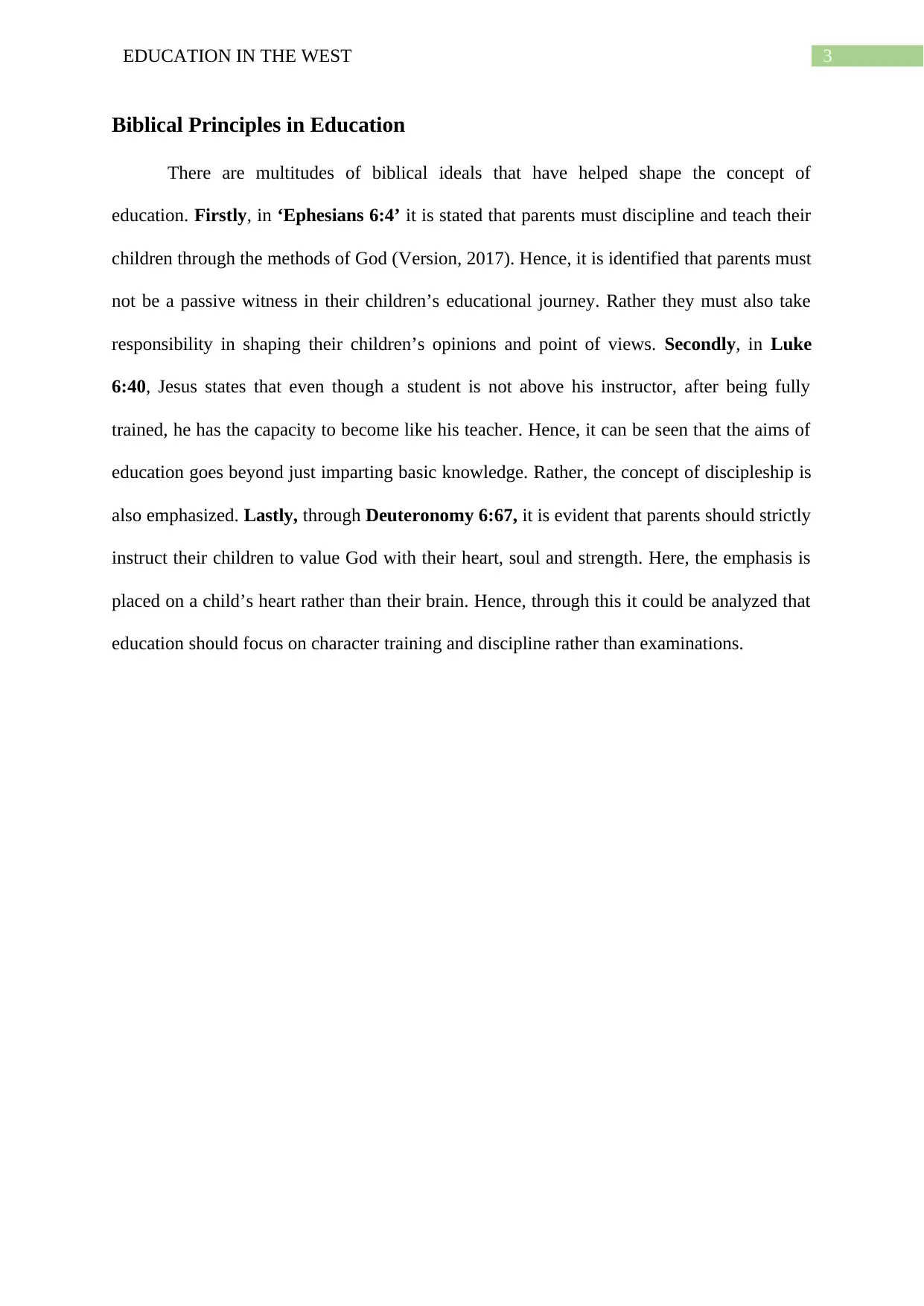
3EDUCATION IN THE WEST
Biblical Principles in Education
There are multitudes of biblical ideals that have helped shape the concept of
education. Firstly, in ‘Ephesians 6:4’ it is stated that parents must discipline and teach their
children through the methods of God (Version, 2017). Hence, it is identified that parents must
not be a passive witness in their children’s educational journey. Rather they must also take
responsibility in shaping their children’s opinions and point of views. Secondly, in Luke
6:40, Jesus states that even though a student is not above his instructor, after being fully
trained, he has the capacity to become like his teacher. Hence, it can be seen that the aims of
education goes beyond just imparting basic knowledge. Rather, the concept of discipleship is
also emphasized. Lastly, through Deuteronomy 6:67, it is evident that parents should strictly
instruct their children to value God with their heart, soul and strength. Here, the emphasis is
placed on a child’s heart rather than their brain. Hence, through this it could be analyzed that
education should focus on character training and discipline rather than examinations.
Biblical Principles in Education
There are multitudes of biblical ideals that have helped shape the concept of
education. Firstly, in ‘Ephesians 6:4’ it is stated that parents must discipline and teach their
children through the methods of God (Version, 2017). Hence, it is identified that parents must
not be a passive witness in their children’s educational journey. Rather they must also take
responsibility in shaping their children’s opinions and point of views. Secondly, in Luke
6:40, Jesus states that even though a student is not above his instructor, after being fully
trained, he has the capacity to become like his teacher. Hence, it can be seen that the aims of
education goes beyond just imparting basic knowledge. Rather, the concept of discipleship is
also emphasized. Lastly, through Deuteronomy 6:67, it is evident that parents should strictly
instruct their children to value God with their heart, soul and strength. Here, the emphasis is
placed on a child’s heart rather than their brain. Hence, through this it could be analyzed that
education should focus on character training and discipline rather than examinations.
Paraphrase This Document
Need a fresh take? Get an instant paraphrase of this document with our AI Paraphraser
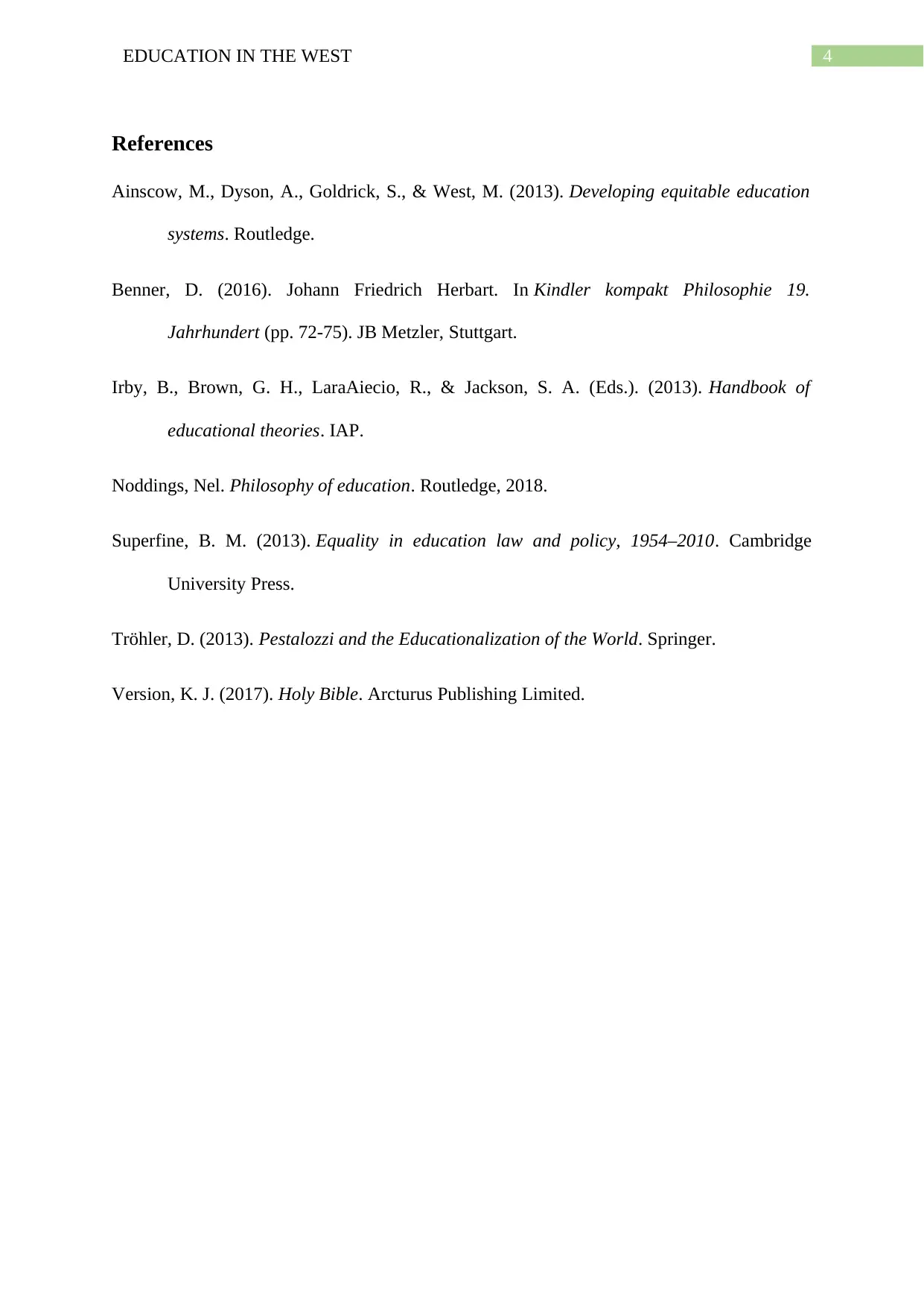
4EDUCATION IN THE WEST
References
Ainscow, M., Dyson, A., Goldrick, S., & West, M. (2013). Developing equitable education
systems. Routledge.
Benner, D. (2016). Johann Friedrich Herbart. In Kindler kompakt Philosophie 19.
Jahrhundert (pp. 72-75). JB Metzler, Stuttgart.
Irby, B., Brown, G. H., LaraAiecio, R., & Jackson, S. A. (Eds.). (2013). Handbook of
educational theories. IAP.
Noddings, Nel. Philosophy of education. Routledge, 2018.
Superfine, B. M. (2013). Equality in education law and policy, 1954–2010. Cambridge
University Press.
Tröhler, D. (2013). Pestalozzi and the Educationalization of the World. Springer.
Version, K. J. (2017). Holy Bible. Arcturus Publishing Limited.
References
Ainscow, M., Dyson, A., Goldrick, S., & West, M. (2013). Developing equitable education
systems. Routledge.
Benner, D. (2016). Johann Friedrich Herbart. In Kindler kompakt Philosophie 19.
Jahrhundert (pp. 72-75). JB Metzler, Stuttgart.
Irby, B., Brown, G. H., LaraAiecio, R., & Jackson, S. A. (Eds.). (2013). Handbook of
educational theories. IAP.
Noddings, Nel. Philosophy of education. Routledge, 2018.
Superfine, B. M. (2013). Equality in education law and policy, 1954–2010. Cambridge
University Press.
Tröhler, D. (2013). Pestalozzi and the Educationalization of the World. Springer.
Version, K. J. (2017). Holy Bible. Arcturus Publishing Limited.
1 out of 5
Related Documents
Your All-in-One AI-Powered Toolkit for Academic Success.
+13062052269
info@desklib.com
Available 24*7 on WhatsApp / Email
![[object Object]](/_next/static/media/star-bottom.7253800d.svg)
Unlock your academic potential
Copyright © 2020–2026 A2Z Services. All Rights Reserved. Developed and managed by ZUCOL.




